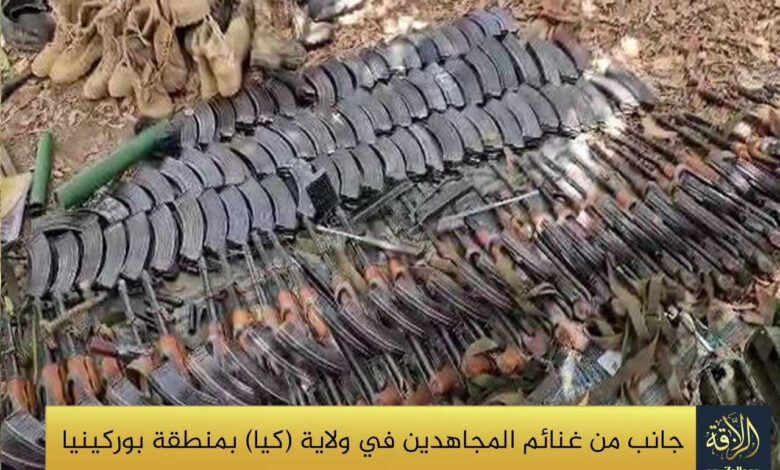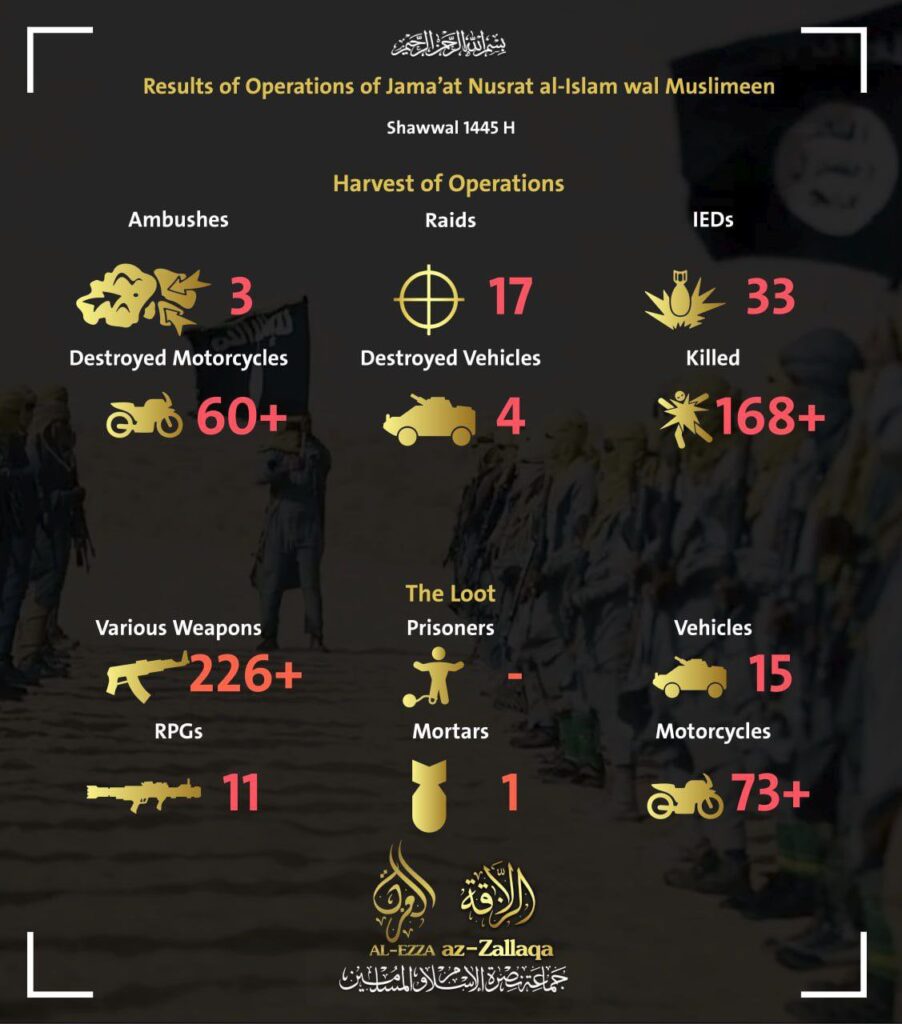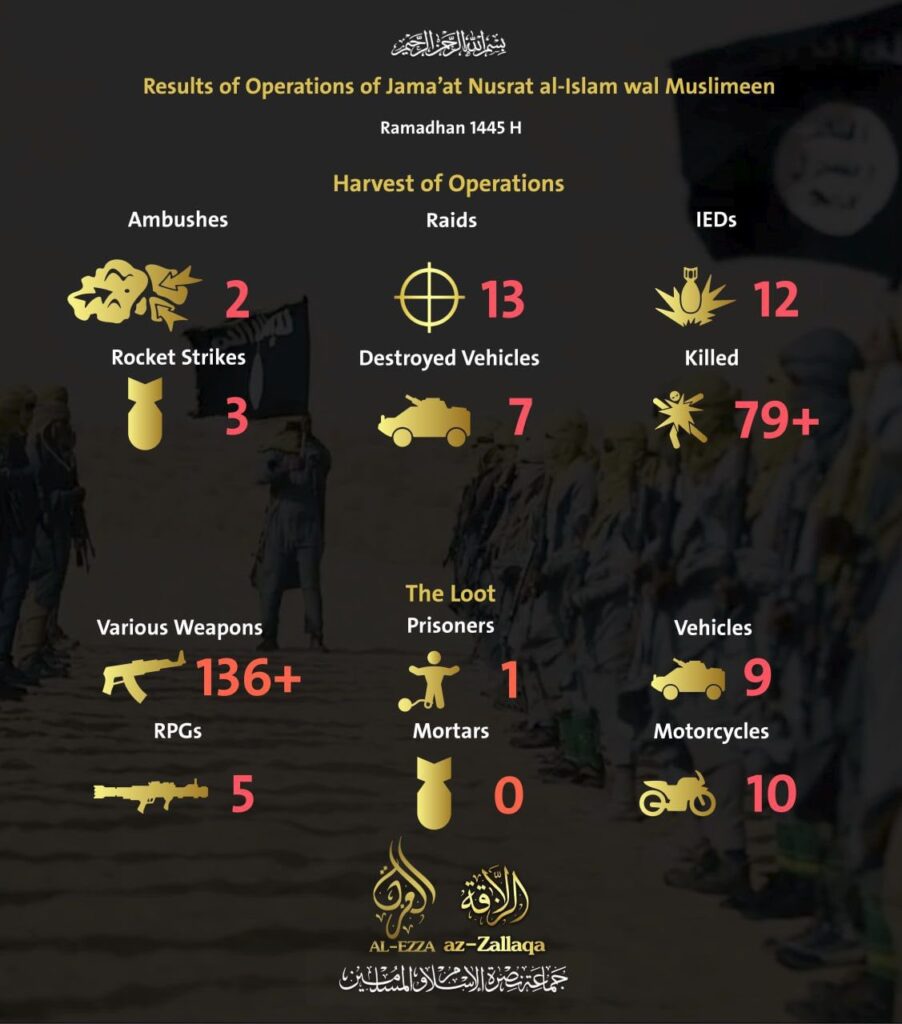
As violence continues to escalate in the Sahel region of Africa, Jama’at Nusrat al-Islam wal Muslimeen (JNIM) has been intensifying its campaign of terror, particularly in the Central Sahel, which comprises Mali, Burkina Faso, and the Niger Republic.
Newly released data by the group detailing their operations for the Islamic month of Shawwal 1445 H, corresponding to April and May 2024, provides a snapshot of the violence that has gripped the region.
The data released by the jihadist coalition revealed a significant increase in their operational activities compared to the previous month of Ramadan (March–April), highlighting the ongoing threats posed by JNIM and the broader implications for stability and security in the region.
According to the infographics, in the month of Shawwal, JNIM carried out three attacks, leading to the destruction of over 60 motorcycles, alongside 17 raids that resulted in the destruction of 21 vehicles, including armoured vehicles.
This period also saw 33 Improvised Explosive Devices (IED) incidents, causing over 168 fatalities. The group’s looted assets included more than 226 various weapons, 11 RPGs, and a single mortar, along with 15 vehicles and 73 motorcycles.

The latest data shows a significant increase in comparison to the preceding month of Ramadan 1445 H, which witnessed a slightly different operational pattern. In Ramadan, JNIM executed two ambushes, destroying three vehicles with rocket strikes.
The month also witnessed 13 raids, resulting in the destruction of 20 vehicles, including seven armoured vehicles. There were also 12 IED incidents, leading to at least 79 deaths. The loot comprised over 136 various weapons, five RPGs, one prisoner, nine vehicles, and 10 motorcycles.
The data from the last two months provides critical insights into JNIM’s evolving strategies and sustained operational capabilities.

The group’s ability to conduct frequent and effective attacks across a wide area poses significant challenges for regional governments and international forces.
While both months saw ambushes, the notable difference in Shawwal was the number of destroyed motorcycles, which are crucial for mobility in the Sahel, particularly for jihadists and local forces. This strategic attack could impair the local forces’ movement and logistical support.
Furthermore, the seizure of weapons and vehicles is crucial for sustaining JNIM’s campaign. The Shawwal period saw a higher capture of various weapons (226+ compared to 136+) and RPGs (11 vs. 5). The greater quantity of looted motorcycles in Shawwal (73+ vs. 10) emphasizes JNIM’s focus on maintaining high mobility.
Raids remain a constant in JNIM’s operational playbook. Shawwal saw 17 raids, slightly higher than the 13 in Ramadan. The focus on destroying vehicles, particularly armoured ones, demonstrates a targeted approach to diminishing the defensive capabilities of regional security forces.
IED incidents were notably higher in Shawwal, with 33 occurrences compared to 12 in Ramadan. This disparity highlights the fluctuating yet persistent threat posed by these devices. The 168+ fatalities in Shawwal starkly contrast with the 79+ in Ramadan, underscoring the lethal effectiveness of IEDs.
These devices continue to be a favoured tactic for JNIM due to their ability to cause significant casualties, instil fear, and disrupt military operations with relatively low investment.
Behind these numbers lie the harrowing human costs. Each ambush, raid, and IED attack translates to lives lost, families displaced, and communities living in fear. The high death toll from IEDs particularly underscores the vulnerability of civilians and the ongoing challenge for regional forces to effectively counter such threats.
The Central Sahel region, where JNIM primarily operates alongside the Islamic State in the Sahel (IS-Sahel), has been experiencing a significant increase in insecurity, particularly after the withdrawal of French troops, which left a vacuum that has been exploited by violent extremist organisations.
The Sahel is now primarily under the control of military juntas and is facing a decade-long jihadist insurgency. According to the Armed Conflict Location & Event Data Project (ACLED), a non-governmental organisation specialising in disaggregated conflict data collection, analysis, and crisis mapping, the region is likely to remain volatile till the end of 2024 despite the presence of the Wagner Group (rebranded Africa Corp.) in the region.
Support Our Journalism
There are millions of ordinary people affected by conflict in Africa whose stories are missing in the mainstream media. HumAngle is determined to tell those challenging and under-reported stories, hoping that the people impacted by these conflicts will find the safety and security they deserve.
To ensure that we continue to provide public service coverage, we have a small favour to ask you. We want you to be part of our journalistic endeavour by contributing a token to us.
Your donation will further promote a robust, free, and independent media.
Donate HereStay Closer To The Stories That Matter




